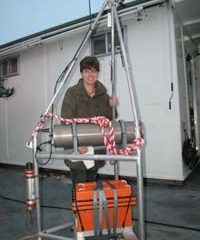A new University of Colorado at Boulder study of Jupiter’s moon Europa may help explain the origin of the giant ice domes peppering its surface and the implications for discovering evidence of past or present life forms there.
Assistant Professor Robert Pappalardo and doctoral student Amy Barr previously believed the mysterious domes may be formed by blobs of ice from the interior of the frozen shell that were being pushed upward by thermal upwelling from warmer ice underneath. Europa

Harbor Branch researcher deploying innovative camera system in Monterey Bay
Using a new lighted jellyfish lure and a unique camera system, researchers from HARBOR BRANCH are working to reveal for the first time life in the deep sea unaltered by the cacophony of sound and light that have been an integral part of most past research there. From Sept 2-5 a team will be using the lure for the first time in the dark depths of California’s Monterey Bay.
“We are hoping to do so

Harry Green comments on a paper in Nature
In a commentary in the Aug. 21 issue of Nature, Harry Green, Distinguished Professor of Geology and Geophysics in the Institute of Geophysics and Planetary Physics and the department of earth sciences at UC Riverside, explains that two large, deep earthquakes (depth > 300 km below the surface of the earth) that occurred in Aug. 2002 in the Tonga subduction zone were causally related.
The Tonga subduction zone is approximately beneath
Scientists are a step closer to understanding how the world’s oceans influence global warming – as well supply us with the oxygen we breathe.
A study led by Imperial College London has revealed how the most abundant ocean bound photosynthetic bacterium helps control levels of the greenhouse gas, carbon dioxide.
Reporting in Nature the researchers provide new detail on how Prochlorococcus cyanobacteria traps atmospheric carbon dioxide and stores it in the deep sea.
Wo
What caused the worst mass extinction in Earth’s history 251 million years ago? An asteroid or comet colliding with Earth? A greenhouse effect? Volcanic eruptions in Siberia? Or an entirely different culprit? A Northwestern University chemical engineer believes the culprit may be an enormous explosion of methane (natural gas) erupting from the ocean depths.
In an article published in the September issue of Geology, Gregory Ryskin, associate professor of chemical engineering, suggests t
“My observations from a few years ago were that Ice Stream D in the West Antarctic was slowing to about half average speed and then speeding up,” says Dr. Sridhar Anandakrishnan, associate professor of geoscience, Penn State.